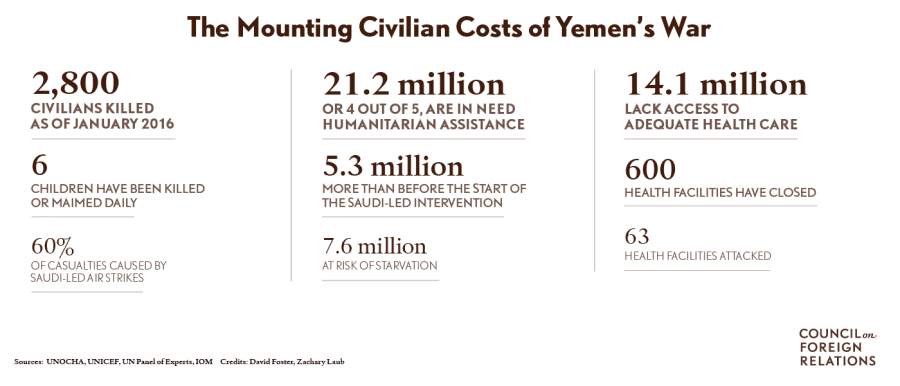Let’s talk about Yemen, U.S. involvement
Syria has been brought to the forefront this election cycle, quite rightfully, as a humanitarian disaster.
But there is another crisis unfolding in the Middle East, one that our country is even more directly involved in.
Most of the focus recently in the U.S. has been on Aleppo, as Syrian president Bashar al-Assad’s government forces and Russian air strikes have hammered civilian targets.
The U.S. presidential campaign has brought up a number of possible solutions — no-fly zones, refugee corridors and more — but have ignored another recent military incident about 1,500 miles to the south of Syria.
On Oct. 15, the USS Mason, a destroyer, was targeted by three failed missiles from Yemen. In response, the U.S. knocked out a radar installation from the Iranian-aligned Houthi faction, according to Reuters.
But this is only a temporary escalation of the U.S.’s involvement, which goes back to the beginning of Yemen’s civil war in 2015.
As the Saudis lead a coalition, the main faction opposed to the Houthi fighters, on behalf of the Hadi government, the U.S., along with Britain and France, has continued to sell the Saudis arms. Just last year, the U.S. sold $1.3 billion worth of arms to Saudi Arabia.
Saudi Arabia has used some of those arms to commit war crimes, including the bombing of a funeral on Oct. 8 that killed 100 and wounded 500, according to Human Rights Watch. The weapon used in the attack — a 500-pound, laser-guided bomb — was made in the U.S.
The victims join the ranks of the roughly 3,800 civilians that have died since the war began, 60 percent of them due to Saudi airstrikes, according to Reuters.
Nor is this a new issue.
In March, Rasha Mohamed, Amnesty International’s Yemen researcher, wrote an editorial for Foreign Policy arguing for the U.S. to stop selling arms to the Saudis if they continue to commit war crimes.
“Hundreds of civilians have been killed in airstrikes while asleep in their homes, when going about their daily activities or in the very places where they had sought refuge from the conflict,” she wrote. “The United States, Britain and others, meanwhile, have continued to supply a steady stream of weaponry and logistical support to Saudi Arabia and its coalition.”
The situation has become so bad that, on Oct. 10, Reuters reported that U.S. government lawyers are worried that we might be held accountable for Saudi war crimes, as our military aid might make us a “co-belligerent” in the war against the Houthi.
The discussion came up during a review of the sale of precision munitions, perhaps including the weapon that was used earlier this month.
I am no expert on the Middle East, and I understand our political interests and alliances are complex. I am still unsure of what the best way to intervene in Syria is.
However, if we have reached the point where America is continuing to provide the materials for another country to commit war crimes it is obvious we have done something wrong.
It is easy to distance ourselves from events that are complicated and far away. I must confess, I have only recently begun to follow the events in Yemen.
But if we are going to encourage our government to intervene in the humanitarian disasters of Iraq and Syria, we should demand that they not help create further humanitarian disasters in Yemen.
If we do not, not only will more innocents die but the U.S. will lose even more moral authority when we try to apply pressure to Russia or Assad to stop their bombing campaigns.
So as we talk about no-fly zones and stopping the barrel bombs raining down on Aleppo, we need to consider our role in supplying laser-guided bombs to rain down on civilians in Yemen.









